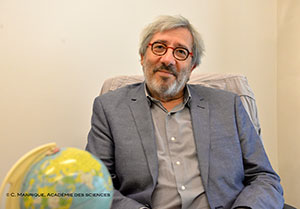Patrick Flandrin - Modern as Fourier
- Keynote Speech

Patrick Flandrin obtained his PhD from INP Grenoble in 1982. He is currently a CNRS senior scientist, working within the Physics Department of ENS de Lyon since 1991. His research interests include mainly nonstationary signal processing, time-frequency/wavelet methods, scaling stochastic processes and complex systems. Dr. Flandrin was awarded the Philip Morris Scientific Prize in Mathematics (1991), the SPIE Wavelet Pioneer Award (2001), the Prix Michel Monpetit from the French Academy of Sciences (2001), the Silver Medal from CNRS (2010), and the Technical Achievement Award from the IEEE Signal Processing Society (2017). He is a Fellow of the IEEE (2002) and of EURASIP (2009). Elected member of the French Academy of Sciences in 2010, he is currently its Vice-president.
Joseph Fourier holds a special position in the history of sciences, with respect of course to his scientific career, but also to his political actions and his societal impact. Rightly considered as one of the fathers of mathematical physics [1], Fourier built his magnum opus—the Analytical Theory of Heat [2]—on a vision of science that is astonishingly modern, beyond conventional barriers between disciplines. Fourier has however been long ignored, whereas he has been more than instrumental in the numerical revolution we experience since the 50s and that is now an integral part of our everyday life: without Fourier, no JPEG, no MP3, no algorithms for medical or astronomical imaging! As a follow-up of the « Fourier year » which has celebrated in 2018 the 250thanniversary of Fourier’s birthday [3], we will sketch the life and legacy of this exceptional figure, and underline how much his pioneering works paved the way for avenues which never ceased to be explored, with recent contributions whose spectrum spans large and complementary aspects of physics and information sciences [4].
[1] J. Dhombres and J.-B. Robert, Joseph Fourier, créateur de la physique mathématique, Collection « Un savant, une époque », 767 p., Belin, Paris, 1998.
[2] J.-B. Fourier, Théorie Analytique de la Chaleur, 639 p., Chez Firmin Didot, Paris, 1822 (https://gallica.bnf.fr/ark:/12148/bpt6k1045508v.texteImage)
[3] http://perso.ens-lyon.fr/patrick.flandrin/Fourier250
[4] C. Bernardin and P. Flandrin (eds.), Special Issue « Fourier and the science of today, » Comptes Rendus de l’Académie des sciences, T. 20, No. 5, 2019.




